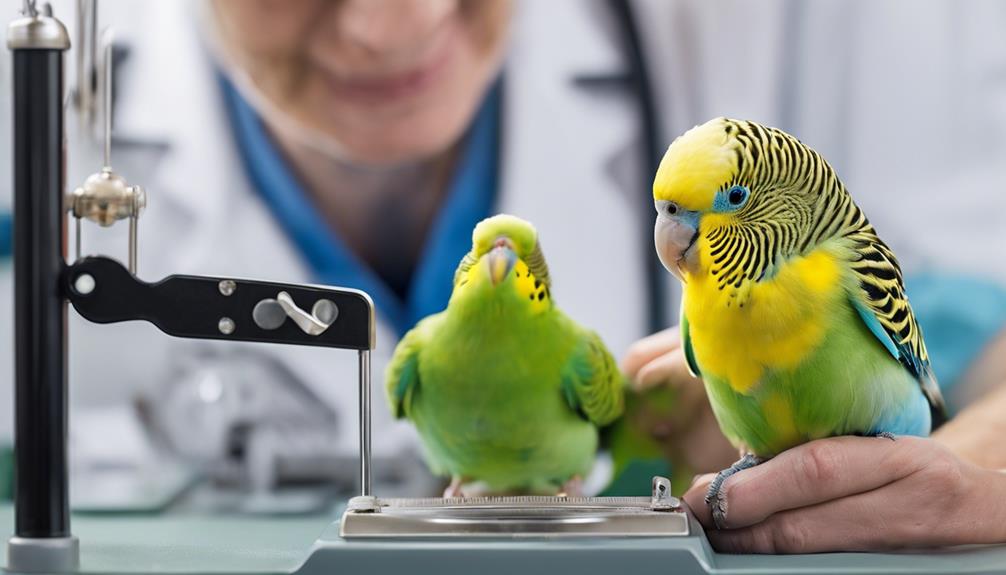When and How Often Should Your Budgerigar (Budgie) Visit a Vet

Regular vet check-ups for budgerigars are essential for maintaining their health and well-being. These check-ups should ideally be scheduled at least once a year to ensure early detection of any potential health issues. Additionally, if you notice any changes in your budgie’s behavior, appetite, or droppings, it is important to seek veterinary advice promptly. Being proactive about your budgie’s health can help prevent serious illnesses and ensure a long and happy life for your feathered friend.
It is also crucial to be aware of subtle cues that may indicate your budgie is unwell. These can include changes in vocalizations, fluffed-up feathers, decreased activity levels, or a lack of interest in food. By paying attention to these signs and seeking veterinary care when needed, you can help your budgerigar stay healthy and thrive in your care.
Importance of Regular Vet Check-ups
Regularly visiting a vet is crucial for maintaining the health and well-being of budgerigars. Routine examinations and wellness checks are essential components of responsible pet ownership. Just like any other animal companion, budgies require regular vet visits to ensure their overall health and detect any potential issues early on.
During these regular vet check-ups, the avian veterinarian will assess your bird’s physical condition, check for signs of illness, and provide necessary vaccinations or treatments. Regular vet visits also allow for monitoring your budgie’s weight, beak, and nail health, as well as evaluating their diet and living conditions for optimal bird health.
Signs That Your Budgie Needs Veterinary Attention
When observing your budgie, be vigilant for any unusual behaviors or physical symptoms that may indicate the need for veterinary attention. Here are some signs to watch out for:
- Behavioral changes: Keep an eye out for any sudden shifts in your budgie’s behavior, such as increased aggression, lethargy, or repetitive actions that are out of the ordinary.
- Weight loss: If you notice your budgie losing weight unexpectedly, it could be a sign of an underlying health issue that requires prompt veterinary evaluation.
- Feather abnormalities: Check your budgie’s feathers regularly for any signs of discoloration, plucking, or fluffing up excessively, as these could indicate health problems.
Additionally, pay attention to any breathing issues your budgie may be experiencing, such as wheezing, difficulty breathing, or tail-bobbing, which could all signal the need for immediate veterinary care. Being proactive and recognizing these signs early can help ensure your budgie receives timely and appropriate medical attention.
First Vet Visit: What to Expect
When taking a budgie to the vet for the first time, owners may wonder what to expect during the initial check-up. It’s essential to understand the basic elements of this first visit to ensure the bird receives proper care.
Additionally, knowing what follow-up care tips to expect can help owners continue to provide the best possible care for their feathered friend.
Initial Check-Up Essentials
During the first vet visit for your budgerigar, expect the veterinarian to conduct a thorough examination to assess your bird’s overall health and well-being. This initial check-up is crucial in establishing a baseline for your budgie’s health and addressing any potential issues early on.
Here are some essentials to expect during this visit:
- Diet management: The vet may provide guidance on the best diet for your budgie’s specific needs.
- Feather grooming: Your veterinarian might check for any signs of feather abnormalities or offer tips on maintaining healthy plumage.
- Cage setup: Expect advice on optimizing your budgie’s cage environment for its well-being.
This comprehensive evaluation sets the stage for a happy and healthy life for your feathered friend.
Follow-Up Care Tips
After the initial check-up essentials have been addressed, budgerigar owners should be prepared to receive follow-up care tips during their bird’s first vet visit.
The vet may provide valuable advice on diet tips to ensure optimal nutrition for the budgie’s health. Additionally, behavior training suggestions might be offered to help owners understand and manage their budgie’s actions effectively.
Cage hygiene will be emphasized to prevent potential health issues, guiding owners on proper cleaning routines. Toy selection recommendations could also be given to keep the budgie mentally stimulated and physically active.
Following these follow-up care tips diligently will contribute to the overall well-being and happiness of the beloved budgerigar.
Common Health Issues in Budgerigars
Common health issues in budgerigars may include respiratory infections, nutritional deficiencies, and mites infestations. These problems can impact the overall health and well-being of your feathered friend.
- Respiratory Infections: Budgerigars are susceptible to respiratory issues, especially when exposed to drafts or sudden temperature changes. Symptoms may include sneezing, nasal discharge, and labored breathing.
- Nutritional Deficiencies: Improper diet management can lead to various deficiencies in budgerigars, affecting their feathers, beak, and overall energy levels. Providing a balanced diet is crucial for their health.
- Mites Infestations: Mites are a common nuisance for budgerigars, causing itching, irritation, and feather plucking. Regularly checking your budgie for signs of mites and promptly treating infestations is essential.
Being aware of these common health issues and taking preventive measures can help keep your budgerigar healthy and happy. If you notice any concerning symptoms, consult a veterinarian specializing in avian care for proper diagnosis and treatment.
Vaccinations and Preventive Care
Exploring the significance of vaccinations and the essentials of preventive care for budgerigars is crucial in maintaining their health and well-being. Understanding why vaccinations are important and implementing preventive measures can help safeguard these beloved birds from common illnesses.
Vaccination Importance Explained
Understanding the importance of vaccinations for budgerigars is essential for ensuring their long-term health and well-being. Vaccinations offer numerous benefits in protecting budgies from various diseases, but they also come with potential risks that need to be considered.
When it comes to vaccination, pet owners should be aware of the recommended schedule and different options available to safeguard their feathered friends effectively.
- Vaccinations provide immunity against common diseases.
- Regular vaccinations help prevent outbreaks in bird communities.
- Consult a vet to determine the most suitable vaccination plan for your budgie.
Preventive Care Essentials
For optimal budgerigar health, prioritizing preventive care such as vaccinations is crucial to safeguarding your bird’s well-being and longevity.
In addition to vaccinations, diet management plays a significant role in preventing health issues in budgerigars. Ensuring a balanced diet rich in nutrients is essential for maintaining their overall health and immune system.
Training techniques can also be considered part of preventive care, as they help in addressing behavioral issues early on, promoting a harmonious relationship between you and your budgie.
When it comes to cage setup, providing a safe and stimulating environment is key to preventing accidents and ensuring your budgerigar’s mental well-being.
How Often Should Your Budgie See a Vet?
Regular veterinary check-ups are essential to ensure your budgie’s health and well-being. When considering how often your budgie should visit the vet, several factors come into play:
- Annual Wellness Exams: Just like with any pet, scheduling an annual check-up is crucial. This allows the vet to assess your budgie’s overall health, address any concerns, and provide preventive care.
- Behavior Changes: If you notice significant changes in your budgie’s behavior, such as increased aggression, lethargy, or changes in eating habits, it’s essential to seek veterinary advice promptly. These changes could indicate underlying health issues that need attention.
- Feather Condition: Regularly monitoring your budgie’s feather condition is vital. If you observe abnormalities like feather plucking, discoloration, or excessive molting, consulting with a vet is recommended to identify and address any potential health issues.
Finding the Right Avian Veterinarian
When seeking the right avian veterinarian for your budgerigar, prioritize experience with avian species and a strong reputation within the bird-owning community. Choosing the right vet for your feathered friend is crucial for their well-being. Look for avian vet qualifications such as specialized training in bird care, experience handling budgerigars, and a genuine love for avian species. A vet who understands the unique needs of budgerigars can provide the best care possible. Here is a helpful table to guide you in selecting the perfect avian veterinarian:
| Qualification | Description |
|---|---|
| Specialized Training | Look for vets with specific avian training |
| Experience | Find a vet with a proven track record |
| Passion | Seek a vet who genuinely loves birds |
| Reputation | Ask for recommendations within the community |
| Emergency Care | Ensure the vet offers emergency services |
Frequently Asked Questions
Can Budgerigars Be Prone to Specific Health Issues Based on Their Age or Breed?
Budgerigars can be prone to age-related illnesses and breed-specific conditions. Preventative care and health monitoring are crucial to catch any issues early. Regular vet check-ups are recommended to ensure the well-being of these beloved feathered friends.
Are There Any Alternative or Home Remedies That Can Be Used for Minor Health Concerns in Budgies?
When it comes to minor health concerns in budgies, some owners may consider herbal remedies or DIY first aid. While these options have their limitations, they can be helpful for non-urgent issues. However, using them carries risks that should be carefully weighed.
How Can I Help My Budgie Feel More Comfortable and Less Stressed During Vet Visits?
When it comes to helping a budgie feel comfortable during vet visits, stress reduction is key. Grooming techniques, travel preparation, and calming methods like soothing music or coverings can all contribute to creating a more relaxed environment for your feathered friend.
Are There Any Specific Dietary or Environmental Factors That Can Impact a Budgie’s Health and Require Veterinary Attention?
Diet management plays a crucial role in a budgie’s health. Environmental toxins can lead to various health issues, necessitating veterinary attention. Regular exercise routines and mental stimulation are vital for a budgie’s well-being, promoting overall health and happiness.
What Are Some Tips for Finding a Reputable Avian Veterinarian Who Specializes in Treating Budgerigars?
When seeking a reputable avian veterinarian specializing in budgerigars, individuals can ask for avian vet referrals from local bird clubs or use online resources like directories. Considering budgie health insurance options can provide financial support for veterinary care.











